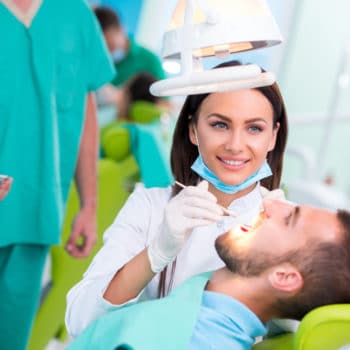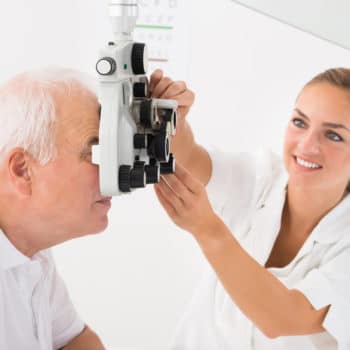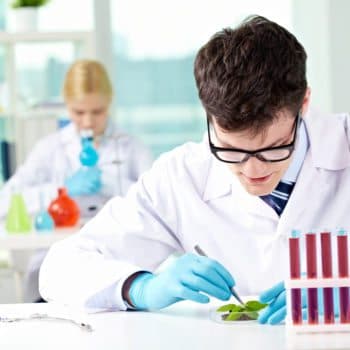Why We Love It
-
$192,120Potential Avg. Salary*
-
Growing DemandJob Outlook
* Salary & growth data is based on the recent Bureau of Labor and Statistics data published at https://www.bls.gov/oes/current/oes291062.htm for 29-1062 Family and general practitioners 11/2021. Based on national data, not school-specific information. Conditions in your area may vary.
Students who want to work as doctors, dentists, pharmacists, and physical therapists may benefit from opting to substitute the traditional pre-med biology degree with a bachelor of science in human sciences.
A human sciences degree is a scientific degree program that’s focused specifically on topics in human health, biology, and anatomy, offering enhanced and detailed preparation for graduate school.
What is a Degree in Human Sciences?
Becoming a medical professional requires an advanced, professional degree, but before students can enroll in graduate school, they must complete a bachelor’s degree program.
While many programs offer coursework in math and science subjects required to perform well on the MCAT entrance exam, only a human sciences degree focuses completely on teaching students about topics related to human health. Students focus on biology, disease, psychology, physiology, and anatomy—but from a human-focused approach rather than across all life forms.
In a human sciences program, students can focus a portion of their upper-level coursework on human health areas they’re particularly interested in. Students may take courses in pharmacology, immunology, human development, and other related subjects to better prepare for the coursework they’ll encounter in graduate school.
Graduates typically go on to earn professional graduate degrees, though they can find work with bachelor’s degrees as well in healthcare administration, medical assistant, and public health roles.
Recommended Schools
What Courses Would I Take For a Major in Human Sciences?
- Language of Health and Disease
- Human Biology
- Health Promotion and Disease Prevention
- Research Theory in Healthcare
- Behavioral Science
- Genetics and Genomics
- Molecular Cell Biology
- Health Topics in Neuroscience
What Jobs Can You Get with a Degree in Human Sciences?
One of the largest generations of our time—the Baby Boomers—are currently past r nearing retirement age, entering a time in their lives when they’re at higher risk for medical issues and have a greater need for healthcare.
As this generation continues to age, it’s expected to significantly increase demand for healthcare professionals in roles of all types—from administrators and assistants to physicians and researchers. For this reason, individuals with healthcare degrees have much better-than-average chances of finding employment after graduation.
How Long does it take?
A bachelors in Human Sciences will have a typical length of 4 years in a full time schedule. That said, there are many ways to speed up the timeframe by either taking more units via online coursework, community college, or taking free classes at OnlineDegree.com that could transfer to universities in the US.
Online Human Sciences Degree
Human sciences degree programs are offered entirely online by numerous universities. However, some universities require that some practical courses are studied on campus. It is an attractive choice for working students who are passionate about gaining more knowledge in humanities.
Students are usually required to choose a major or concentration as addictive disorders and recovery studies, human development and family studies, nutritional sciences, retail management and personal finance. Students are required to complete around 120 credit hours to earn a bachelor’s degree.
What Can You Do With a Human Sciences Degree?
Human sciences refer to an interdisciplinary field of study that includes a wide range of studies investigating human life and activities following systemic, rational and verifiable approaches. This science depends on data collected from impartial observation of sensory and psychological experience which are known as subjective and objective phenomena.
Human sciences include social sciences, history, sociology, anthropology, and economics among other disciplines. The wide range of the study provides comprehensive knowledge important to many fields, however, it is usually not enough to qualify for a specific job. It is more important for students who look for general knowledge and a better understanding of human interactions, behavior and psychology.
What does a human sciences student learn?
Studying human science includes many disciplines focusing on related topics. Most students will need to specialize in a certain major during the last one or two years of the study. The following list shows courses that are commonly offered in human sciences degree programs:
- Human development: this course introduces topics related to how people change over time including social, physical, emotional, cognitive and cultural changes.
- Public policy: it is the process of converting governmental policies into actions and executive programs to be applied in the real world.
- Family economics: it is the application of the concepts of economics including decision-making, distribution and production to the study of family.
- Educational psychology: this course focuses on how people learn including individual differences in learning, learning disabilities, gifted learning, instructional process and student outcomes.
- Family background: it is the study of the patterns related to family behaviors which usually have similar forms. It deals with topics such as family roles, power, affiliations, and cohesiveness which are included in the general relationship dynamics.
- Theories of family and human development: there are seven theories proposed to explain human development including maturationist theory, psychoanalytic theory, Erikson’s psychosocial theory, behaviorism theory and biopsychosocial theory. Family theories explain the role of the family and how family therapy can be achieved.
- Nutrition and disease: this course introduces the requirements for healthy nutrition and the diseases that can result from poor nutrition. These diseases usually affect the normal development of humans.
- Issues in human development
Now I have a human sciences degree…where can I work after graduating?
Human sciences are a broad field of study that does not qualify directly for specific careers. They are rather a choice for full-time or working students who are passionate about understanding human behavior and interactions. However, the degree can be useful to advance your career in one of the following jobs:
- Social services program director: programs offer social or financial support which is usually provided by state-funded or nonprofit organizations. Services are usually provided to children or adults with disabilities or specific populations.
- Human services coordinator: this job includes coordinating between several support services providers as child life specialists, psychologists, counselors, case management workers, community economic development officers, disaster relief workers, grief counselors, probation officers and substance abuse counselors.
- Child welfare worker: this is a specialization of social work that is focused on helping children and their families resolve conflicts. They also intervene in cases of child abuse or neglect.
- Family advocate: the role of this job is to assist families in reaching agreements regarding custody, access and guardianship. If the family cannot reach an agreement, then the advocate makes recommendations to the court based on the best interest of the child.
Should I choose a human sciences degree?
Human sciences are not specifically related to certain careers but studying these sciences provides valuable knowledge about humans and communities. Your study will help develop some skills that are useful for most careers:
- Creativity: studying humanities, in general, is one of the most powerful tools to empower creativity. You will understand much about human behavior and psychology and know how to create things that are useful and appealing to the majority of people.
- Strong analytical skills: data related to humanities is not usually straightforward and requires careful analysis to determine significant differences, trends and theories. Analytical skills are useful to all business careers.
- Excellent oral and written communication skills: you will learn how people will respond to your writings or speeches and how to deliver your messages most effectively.
Recommended Schools
Best Jobs for Human Sciences Degrees
For the most part, graduates of health sciences programs go on to earn professional degrees to become doctors, dentists, chiropractors, occupational therapists, or pharmacists.
However, there are career opportunities for those with only bachelor’s degrees. Students may find work as medical assistants, hospital administrators, health educators, or public health administrators for public agencies.
How to save time and money
Our mission is to help you to avoid paying full price for college. We want your Human Sciences degree to be affordable and accessible. Here’s how you could save:
Create Your Free SmartPlan

There are many ways to make college affordable and accessible.
That’s why we created a helpful tool called SmartPlan.
It’s free, and helps you find potential ways to save and tons of information about each school you’re considering
Think of it as your “college blueprint”, to help you instantly craft a path to your degree:
- Which Colleges Match Your Needs
- Ways You Could Save Time & Money
- Free Courses You Could Take for Credit
- Valuable Data and Insights on Each College
- Detailed Steps You Should Take!
See what’s possible for you and generate a free plan within just a few minutes
Create My SmartPlanYou Might also be Interested in
Many visitors who look for a degree in Human Sciences are also interested in the following degrees.











